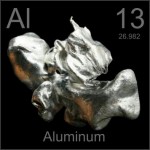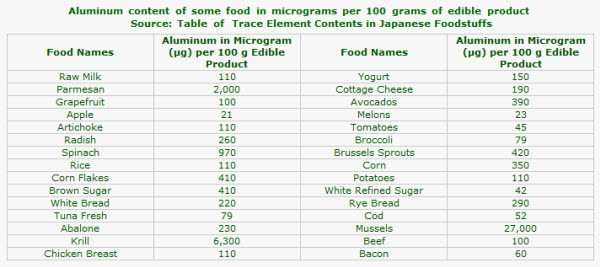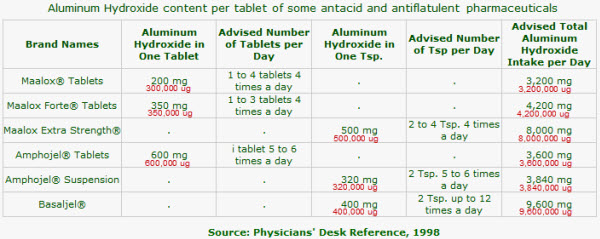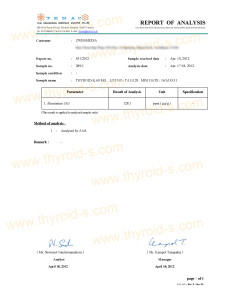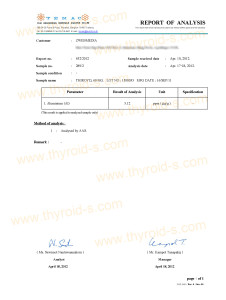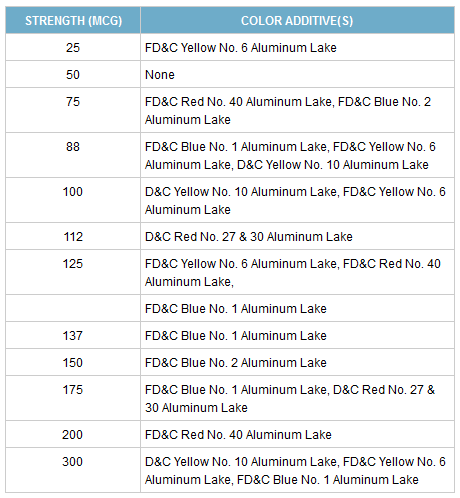Does Thyroid-S Contain Aluminum? – The Definitive Answer
Does Thyroid-S contain aluminum? Well, since all known foods contain aluminum to a varying degree, the short answer is: Yes, Thyroid-S contains aluminum. So does everything else, including water, organic broccoli, Synthroid®, and even mother’s milk. Since aluminum is the 3rd most common element in the earth’s crust (after oxygen and silicon), it should not come as a surprise that aluminum is found in all plants and living organisms. Aluminum is everywhere: in the dirt, in the water, in all plants and animals.
A survey of aluminum in raw waters in the USA reported ranges of 14-290 μg/liter in groundwater and 16-1170 μg/liter in surface waters. Aluminum is also present in very air we breath at nanogram per cubic meter levels as a result of the weathering of aluminosilicate rocks (clay dust) and emissions from industrial sources, automobiles, and cigarette smoke.
In nature (like in food), aluminum does not exist as a metal. The naturally occurring aluminum in food is part of aluminum sulfate, or aluminum oxide, or other essentially harmless compounds. And several studies suggest that less than 1% of dietary inorganic aluminum in food is absorbed by the body. Aluminum is eliminated from the body by the kidneys. Therefore, individuals with renal insufficiency tend to accumulate aluminum due to their inability to excrete it efficiently via the kidneys.
The following table shows the elemental aluminum content of several common foods:
For some people, a far more significant source of dietary aluminum is pharmaceuticals prescribed for common ailments. The following table shows the elemental aluminum content of several common antacid and anti-flatulent pharmaceuticals:
The amounts of aluminum (and converted to micrograms) are shown in red to help to compare them to the amounts in Thyroid-S. As we shall see, some of these common remedies contain 100,000 times more aluminum than Thyroid-S.
The Test Results:
The test for aluminum content was performed using Atomic Absorbtion Spectrophotometry at a certified laboratory in Bangkok. The results showed that Thyroid-S contains 128.1 ppm of aluminum (128 ug/g). This converts to 17 ug of aluminum per tablet. An adult taking 5 tablets per day would receive a daily dose of about 95 ug aluminum per day. Per the table above, this is about the same as the aluminum content in one grapefruit or a glass of ordinary water, and it is significantly lower than a single serving of many other common foods. If we consider the aluminum content of total food intake in one day is on the order of several milligrams, we can say with confidence that Thyroid-S will probably not change the daily dietary exposure to aluminum appreciably.
We can also see from the above tables that the aluminum content of 5 tablets of Thyroid-S is about 100,000 times lower than the common antacid Maalox Extra Strength. A person would need to take 5 tablets of Thyroid-S every day for 273 years to get the same dietary aluminum exposure as one day of Maalox Extra Strength.
You can see lab test report by clicking on the thumbnail below:
The thin, light brown coating on Thyroid-S tablets is distinctive, and not easily duplicated by counterfeiters. Perhaps this is why the manufacturer has decided to manufacture the tablets in this manner.
Also Noteworthy: The food colorings used in Thyroid-S are also the same colorings used in Synthroid®. Perhaps this is why the manufacturer of Thyroid-S chose these colorings. Synthroid® is used by far more people than Thyroid-S (millions more), and I don’t hear anyone asking about aluminum in Synthroid®. Lots of aluminum shown as ingredients of Synthroid® at this link:
http://www.rxlist.com/synthroid-drug.htm
Conclusions:
The goal of minimizing exposure to high levels of dietary aluminum is both prudent and admirable. May we humbly suggest that first and foremost, you should strictly avoid antacids and anti-flatulents, then avoid eating all fruits, grains, nuts, vegetables, dairy, and meat. Then stop drinking all milk, water, and other liquids, and then finally may we recommend to stop taking your Thyroid-S tablets. Or, another option is to change to Thiroyd, which has even lower aluminum content, at less than 1 ug of aluminum per tablet accoring to our verifyable analysis.
If you like this informative, original, and helpful content, please don’t hesitate to give this page a Google+1 click in the right hand column below the smiley face thanks!
Synthroid® is a Registered Trademark of AbbVie Inc.
